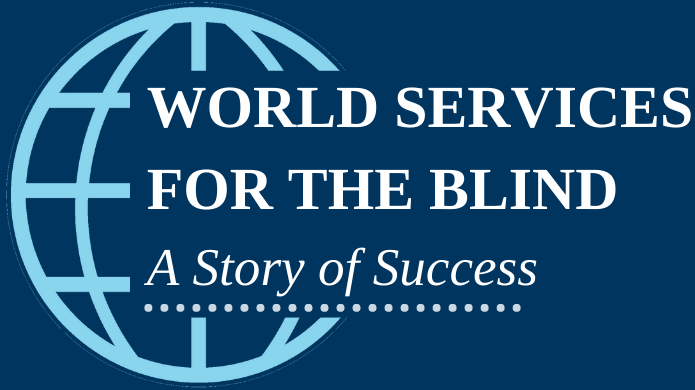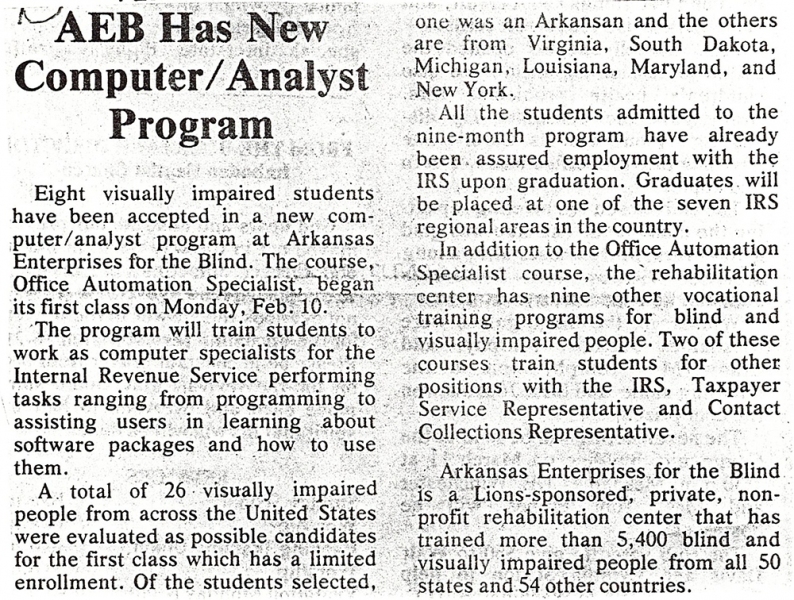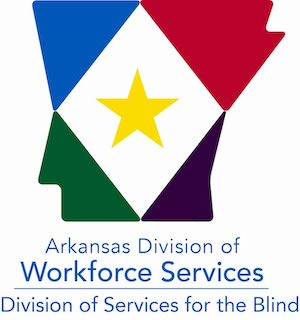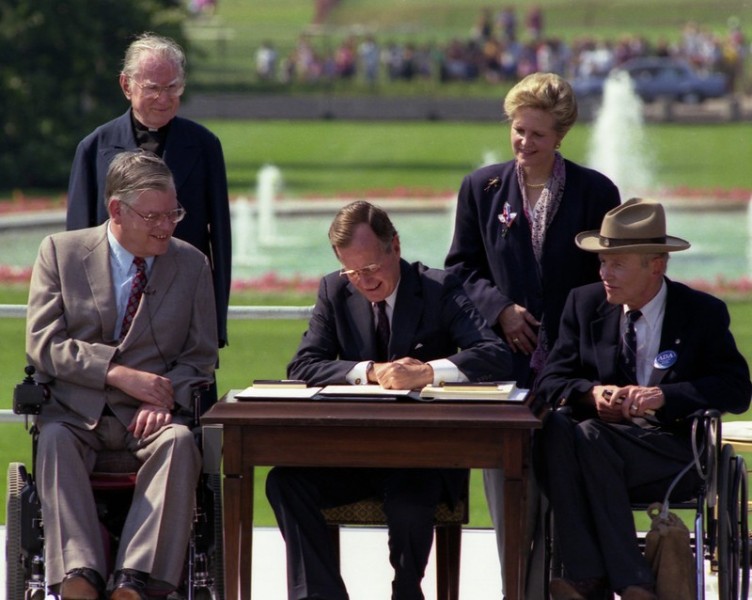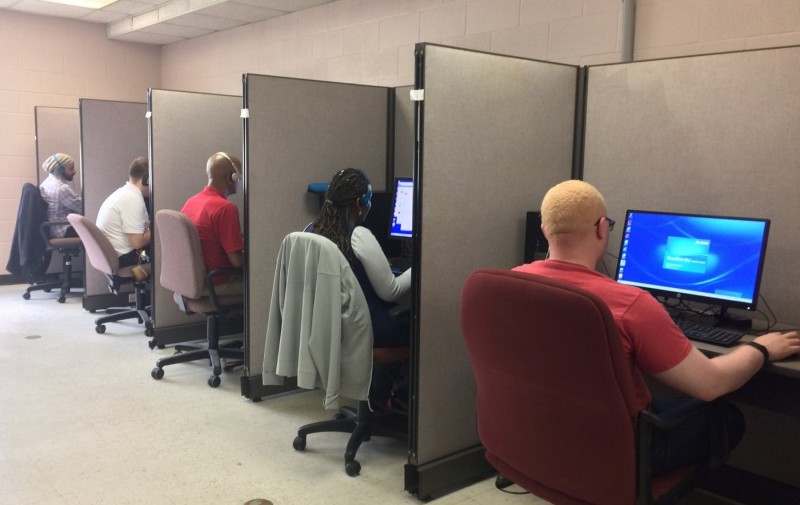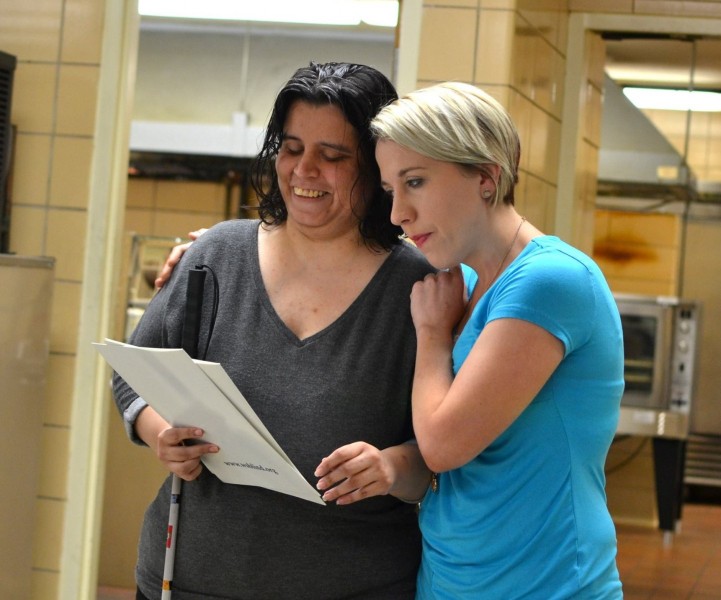LEARN MORE
Present: 1980s-2020s
⠠⠏⠗⠑⠎⠑⠝⠞
From 1980 to 2022, World Services for the Blind (WSB) faced a series of challenges and changes, including state government restructuring, a national recession, and a global pandemic. Despite these difficulties, WSB continued to grow its programs and empower its clients to work and live independently.
By: Katy Morris
Division of Services for the Blind
The 1980s brought significant organizational changes for the public and private blind agencies in Arkansas. In the early years of career development for blind individuals, state vocational rehabilitation (VR) counselors essentially determined the career goals of the clients they served and selected the training facility for them to attend. Arkansas VR counselors often purchased pre-vocational and vocational skills evaluation from WSB due to its accreditation and success rate in training and placing graduates. The most common careers selected by counselors were vending stand operator and Internal Revenue Service (IRS) taxpayer service representative. Additional programs offered at WSB included massage therapy, chiropractic, small engine repair, and piano tuning, among others.
Changes in technology increased the number and variety of jobs available to persons who were blind, and as more job choices became accessible, clients sought control over their career goals. Blind interest groups in Arkansas fiercely lobbied legislators and Governor Bill Clinton to create a state agency for the blind, separate from the Department of Human Services (DHS). This reorganization was highly controversial and caused conflict within the blind community.
In 1983, the Arkansas General Assembly passed Act 481, establishing the Division of State Services for the Blind (DSB) as an autonomous agency governed by a seven-member board, the majority of whom were blind. The board also included five advisory members representing blinded veterans, vending operators, professionals in the field of blindness, the Arkansas School for the Blind, and WSB. Act 481 benefited consumers and blind organizations by providing a public forum for reporting current activities and fostering dialogue among the clients, the state agency, and the organizations.
Expanding Opportunities
As the 1990s approached, the rapid advancement of assistive technology encouraged the signing of the Americans with Disabilities Act (ADA) and the reauthorization of the Individuals with Disabilities Education Act (IDEA). Previously unimaginable rapid access to print drove demand for both innovative products and for WSB’s training programs. Research and development arms of various U.S. companies designated WSB as an ongoing testing site and training location for many newly invented or improved devices.
With every month that passed, technology was evolving, prices were dropping, and doors to new jobs were opening. In response to industry demand, WSB developed career training programs such as hotel and airline reservation sales agents, credit card call center specialists, and retail customer service representatives.
The Workforce Investment Act of 1998 (WIA) codified the principle of “Informed Choice” and radically changed the structure of vocational rehabilitation services across the United States. The principle of informed choice formally shifted the selection of career goals and the choice of training facilities from the state VR counselor to the client. This shift had an unsettling effect on WSB curriculum planning as well as on access planning for institutions of higher education across the nation. Budgeting for qualified instructors, acquiring timely and accessible course materials, obtaining prescribed equipment, etc., became far more difficult.
A New Century
The dawning of the new century brought with it a new era for WSB as well. Working with Microsoft and other major companies, WSB developed programming to qualify trainees as Microsoft Certified Systems Engineers, Systems Professionals, Systems Administrators, and Office Specialists. Other job training programs focused on careers in IRS Contact Collections, Medical Transcription, Horticulture, and Child Care.
With plans to build a larger high-tech campus, WSB acquired seven acres of land near the Clinton Presidential Library in 2004 and 2005. However, the Great Recession of 2008 and other funding uncertainties forced WSB to abandon those plans in 2010. The recession also forced employers to lay off great numbers of seasoned workers, severely limiting employment prospects for newly trained blind individuals. Other challenges WSB faced were its aging campus and the debt from the land purchase.
Continued Success
In 2014, the long-awaited Workforce Innovation and Opportunity Act (WIOA) replaced WIA. The new act continued and strengthened the partnership between employers, state VR counselors, educational institutions, and training facilities such as WSB. It created one-stop centers designed to address all employment needs of blind individuals. The act also emphasized the importance of credit counseling, small business management, and apprenticeships, all of which were folded into WSB’s curriculum.
Though the IRS program ended in 2017, other major training programs surged, including IT Specialist, Certified Medical Billing, Microsoft Office Specialist, and Certified Credit Counselor. Fortunately, WSB began offering online programs a few years before the COVID-19 pandemic hit the United States in 2020. These programs helped sustain the center through the worst case surges and safety restrictions. In fact, WSB was the only blind rehabilitation center in the United States to remain open and continue operations for the duration of the pandemic.
Despite the challenges of the 1980s-2020s, WSB continues to thrive. Its history tells a story of success: how a small training center for blind persons in Little Rock grew to become a prominent source of rehabilitation and vocational training across the nation and around the world.
Sources
Arkansas Enterprises for the Blind. New Life. Little Rock: Lions Clubs of Arkansas, 1997-1998. https://web.archive.org/web/19990504185709/http://www.lwsb.org/nlmaster.htm.
Arkansas Enterprises for the Blind. New Life. Little Rock: Lions Clubs of Arkansas, 1999-2001. https://web.archive.org/web/20011130003741/http://www.lwsb.org/nlmaster.htm.
Arkansas Enterprises for the Blind. New Life. Little Rock: Lions Clubs of Arkansas, 2002-2004. https://web.archive.org/web/20050214234128/http://lwsb.org/nlmaster.htm.
Kumpe, Roy, and Jim Lester. The Lion’s Share: A History of Arkansas Enterprises for the Blind. Little Rock: Rose Publishing Company, 1983.
About the Author
Katy Morris served in the Arkansas Division of State Services for the Blind (DSB) for thirty-two years, retiring in 2018 after ten years as director. She has three children and four grandchildren in Conway, Arkansas, and enjoys hosting birds and growing flowers in her yard.
